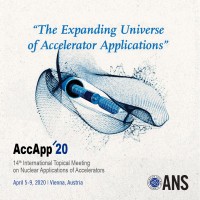AccApp'20: The Expanding Universe of Accelerator Applications
 The 14th International Topical Meeting on Nuclear Applications of Accelerators (AccApp'20) is being organized by the Accelerator Applications Division (AAD) of the American Nuclear Society in cooperation with the International Atomic Energy Agency. AccApp '20 will be held April 5-9 at IAEA headquarters in Vienna.
The 14th International Topical Meeting on Nuclear Applications of Accelerators (AccApp'20) is being organized by the Accelerator Applications Division (AAD) of the American Nuclear Society in cooperation with the International Atomic Energy Agency. AccApp '20 will be held April 5-9 at IAEA headquarters in Vienna.
The purpose of the AccApp meetings is to provide an international forum for the dissemination of knowledge on the diverse applications of accelerators. Each conference brings together 150-250 nuclear physicists, accelerator physicists, nuclear engineers, and other experts from around the world, providing them the opportunity to meet and discuss their research face-to-face. These interactions can help establish good working relationships and collaborations to solve common problems across multiple disciplines.
The theme of this year's conference is "The Expanding Universe of Accelerator Applications." The international outreach of the IAEA in engaging its member states has made this conference more global in scope. Through the generous support from the IAEA and the U.S. Department of Energy, a record-breaking number of participants is anticipated.
AccApp '20 will include 10 topics spanning a broad range of accelerator applications. Accelerator design and technology and accelerator facilities will be covered, focusing on accelerators of all scales, from tabletop to large national laboratories. Medical applications of accelerators will include the production of much-needed medical radioisotopes. There will be a nuclear data session, providing new cross-sectional information needed for industrial, medical, and scientific applications, and a materials science session, which will include the development of novel materials needed for nuclear energy applications and studies of radiation effects.
One new topic this year is the use of accelerators for security and forensics. The AAD has been working closely with the U.S. National Nuclear Security Administration's Office of Radiological Security, whose mission is to minimize the propagation of radioactive material and, where possible, to replace existing high-activity sources with safe particle accelerators.
The conference will include presentations on source replacement for blood irradiation, food irradiation, sterilization of medical devices, wastewater treatment, and other industrial applications, as well as the use of accelerators for preserving cultural heritage. One of the hot topics to be discussed is a new concept for a tabletop particle accelerator-a device that can be used in museums for cultural heritage studies, such as provenance and authentication. Also, given the impact of global climate change, the use of accelerators in environmental and nuclear power applications is becoming more important than ever before.
Several high-ranking IAEA officials are expected to be present at the opening plenary session. Najat Mokhtar, IAEA deputy director general for nuclear applications, and Mikhail Chudakov, IAEA deputy director general for nuclear energy, have tentatively agreed to open the meeting. Keith Anderton, counselor for nuclear affairs at the U.S. Mission to International Organizations in Vienna, will also speak at the meeting's opening plenary session. Several representatives of the NNSA's Office of Radiological Security will present during the special sessions at the conference.
With 12 plenary talks, approximately 135 oral presentations divided into three parallel sessions, and over 120 posters, the AAD expects AccApp '20 to be a great success. Anyone wishing to learn the latest in the ever-expanding universe of accelerator applications is urged to attend.

